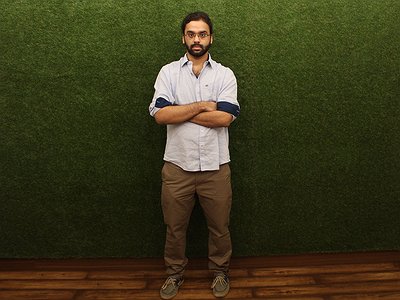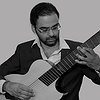Part 1
Name: Vivek Venugopal
Nationality: Indian
Occupation: Composer, guitarist, producer
Current release: Visita's Reveries, Op. 7 can be purchased directly from the Visita Store.
Recommendations: Petrushka by Igor Stravinsky; The Myth of Sisyphus by Albert Camus
If this interview with Vivek Venugopal aka Visita piqued your interest, visit his informative website for further information.
When did you start writing/producing music - and what or who were your early passions and influences? What was it about music and/or sound that drew you to it?
Music came into my life very late.
I started my journey in high school, but much before that, even before I was a musician, I started to search for an identity in music. I found myself unconsciously trying to define myself through the music I listened to. I started to get curious about what it would be like to make music; and the more I listened to, the more curious I got.
Of course, I loved classic rock and all the popular stuff that most people would listen to as kids, but my real nascent influences were several ethnic traditions of music - Celtic, Flamenco, Persian, Bossanova, Hindustani, Malian (specifically the music based around the Kora, an African Harp). There was a certain allure and mysticism to these forms that pulled me towards music as an art form; but then I discovered Bach, who was probably the greatest of my early influences.
Another honourary mention in this list would have to be Pierre Bensusan, a French-Algerian guitarist-composer - I even studied a bit under him.
For most artists, originality is preceded by a phase of learning and, often, emulating others. What was this like for you: How would you describe your own development as an artist and the transition towards your own voice?
I believe that all composers must begin their journey as unbiased and curious perceivers of the art form. My earliest music may be described as an idiosyncratic aggregate of all that I listened to. I’d explore a certain artist or form or tradition of music, with a ‘dash of myself’. While this may be construed by some as pastiche, this is most certainly not the case: it is something more personal. It is more akin to temporarily ‘becoming’ that composer or piece of music, and taking the music somewhere counterintuitive to that composer or piece of music.
There was then a tipping point, and I could truly break free from all that I had heard; the inspiration that I felt from this point onwards, did not include any derivation, and was purely intrinsic. I think this can only happen when one has heard a lot of music, and felt at home in doing so. I reached a point wherein I could go ‘within’ anything I’d listen to, even on the first listen, as though I had listened to it before. The music I made after this had much more clarity, depth, and originality. It was well and truly, my music.
How do you feel your sense of identity influences your creativity?
In my formative years, I was greatly influenced by the existentialist philosophy of Sartre and Camus. I was at a point in my life wherein I was seeking answers. What did I intend on doing with my life? What is worth pursuing? What can bring meaning to my seemingly meaningless life? Existence, precedes essence - as Sartre so poignantly decreed. I had to give my life meaning, and at that point, all I could think of was music.
From then on, my music became a fundamental part of my identity, and being. I often tell people that if they understand my music, then they understand me, probably even more than my family and friends. I believe that all honest art must be a reflection of the self, albeit in an abstract sense.
What were your main creative challenges in the beginning and how have they changed over time?
I had very little formal music education, and I am largely an autodidact. In the beginning, I struggled with learning all that was essential to the art form. I learnt almost everything I know, in a very disorganized but thorough manner. I didn’t have people telling me to study this or that, I just studied whatever or whoever I wanted to. While this haphazard approach borders on agonizing for the first few years, it reaps its benefits later, when the question of originality arises.
As I learnt and explored music in my own way during my formative years, it gave me a better chance to come up with something original, later on. In essence, I ‘learnt how to learn’, and as I matured as a musician, I could apply this methodology and process to the most complex of things, and it now doesn’t take me long to absorb anything that I’d like to, and then take it wherever I want to.
As creative goals and technical abilities change, so does the need for different tools of expression, be it instruments, software tools or recording equipment. Can you describe this path for you, starting from your first studio/first instrument? What motivated some of the choices you made in terms of instruments/tools/equipment over the years?
I started off my journey as a guitarist. In retrospect, I think I started as a composer who could only compose for the guitar, and play the music himself. Very soon, I reached a point wherein I could not fulfill my creative vision with a single guitar. The ideas I was getting - harmonic, melodic, rhythmic, textural - were simply impossible to execute on a guitar. I decided that I must not be limited by the instrument I played and by my specific and limited abilities on it. I guess that’s when I truly became a composer.
This opened up a myriad of possibilities for me. All I needed to do was to imagine the music, the instruments, and get it down on paper, and someone who had dedicated their life to the instrument could interpret and do justice to it, thereby executing my vision.
With regards to the guitar, I also ended up inventing an instrument (along with a luthier), to explore and excavate denser harmonies and different textures. I call it the Visitar, which is a portmanteau of the words 'Visita' & 'Guitar'. This is, in essence, an 8 string acoustic guitar, with one higher and one lower string than a standard guitar. This new instrument is definitely changing the way I look at guitar playing, and I will be releasing some new music with it, as soon as the pandemic allows me to!
Have there been technologies or instruments which have profoundly changed or even questioned the way you make music?
While I consider myself to be a largely ‘analog’ person, I do make use of midi and notational software, to be able to realize my projects. While there was a bit of a learning curve involved, it did change my life for the better. Of course, I don’t really depend on these tools, and I can compose and notate my ideas, but they have certainly made everything a whole lot easier and faster. In this sense, I believe technology has enabled me to be far more prolific than my ‘analog’ days, and I’m grateful to it for that.
I am also open to the electronic realms of music, and I try to incorporate some of these elements into my work, but this affinity is an occasional one: acoustic texture is an integral part of my music.
Collaborations can take on many forms. What role do they play in your approach and what are your preferred ways of engaging with other creatives through, for example, file sharing, jamming or just talking about ideas?
As a composer, collaborations are at the very core of what I do. Without musicians who can skillfully and aesthetically interpret the pieces, music on a paper is basically worthless to the listener. Of course, being the composer, I would naturally have strong opinions about my music’s interpretation, but at the hands of good musicians, an interpretation can completely reimagine my vision for the piece, and take the same music to new realms.
All my collaborations begin with sharing the sheet music with all the musicians. I then listen to the ensemble playing, and we discuss various finer aspects of the performance. Apart from this, there's also the mixed-media spectrum of things, which greatly intrigues me. I have a particular fondness for painting, poetry and philosophy and I am constantly on the lookout for people who'd help me take the narrative aspects of my art to another dimension. I am also interested in doing something with dance and theater, with music at the forefront, reminiscent of ballet and opera, but not strictly. The collaborative process for each of these non-musical forms is very unpredictable, and can take any shape.
Take us through a day in your life, from a possible morning routine through to your work, please. Do you have a fixed schedule? How do music and other aspects of your life feed back into each other - do you separate them or instead try to make them blend seamlessly?
My days begin rather late, haha, but I always hope to start earlier.
I do some yoga at around 9AM, get ready, and go to my studio to work. And then I'm pretty much in the world of music for about 6-7 hours, with a large break in between to cool off (this is also bundled with lunch). The golden hours of composition for me are between 11AM and 3PM. The rest of my time would go into playing the guitar, and/or various forms of musical study. This is pretty much the schedule, 7 days a week, but occasionally I get saturated and take the evening off. However, I never skip the morning session, voluntarily. These strict timelines do get in the way of my personal life, but the people who are really worth it, seem to understand where I come from, and why I am only available at certain odd hours.
With regards to the second half of the question, life and music most definitely feedback into each other for me. What I am feeling, thinking, the people I’m around, events and circumstance, everything seeps into the music. The more I understood composition, the deeper this connection got. At this point, I can even isolate some sections of music and pinpoint exactly what in my life caused my music to sound that particular way, especially with respect to its mood and emotions.






